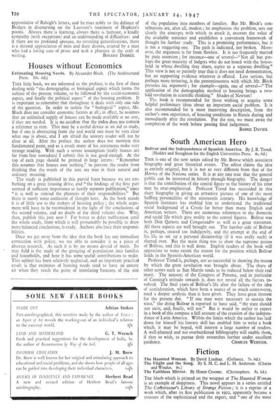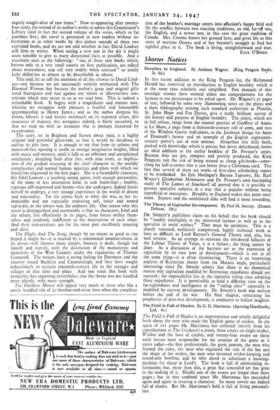Fiction
The Haunted Woman. By David Lindsay. (Gollancz. 7s. 6d.) The Faithless Mirror. By Honor Croome. (Christophers. 8s. 6d.)
THE blurb which is printed on the wrapper of The Haunted Woman is an example of sloppiness. This novel appears in a series entitled The Cortnaisseur's Library of Strange Fiction; it is a reprint of a work which, after its first publication in 1922, apparently became a treasure of the sophisticated and the expert, and " one of the most eagerly sought-after of rare items." Now re-appearing after twenty- four years, the second of its author's works to adorn this Connoisseur's Library (and in fact the second volume of the series, which so far numbers five); the novel is presented to new readers without in- formation as to other works by this,ainhor outside of these two reprinted books, and we are not told whether in fact David Lindsay still lives or writes. When setting a new star in the sky it might seem. sensible to give as many directional facts as possible. And a statement such as the following: " one, of those rare books which, known only to a very small coterie oh first publication, are.talked about everywhere, and sell very widely when reissued " so totally lacks defini-ion as almost to be describable as idiotic.
This said, let us call the attention of all the coteries to David Lind- saynot because we are necessarily entirely enchanted with The Haunted Woman but bedause the author's great and original gifts stand foursquare and vast against any minor or idiosyncratic con- tentions which may occur to us as we read him. This is indeed a remarkable book. It begins with a magnificent and mature ease, wherein we recognise with pleasure a fruitful and honourable apprenticeship to Henry James ; and as the author deepens his theme, labours it and batters overmuch on its repeated crises, this assurance of manner, this arrogance indeed, is finely sustained, so that we read on with an attention that is perhaps increased by exasperation. The story, set in Brighton and Sussex about 1920, is a highly original and powerful ghost-tale, so that it would be invidious to outline its plot here. It is enough to say that from its urbane and matter-of-fact opening it swells to strange imaginative heights, filled with music and mystery, until it falls to an arbitrary and unexplained conclusion ; dropping back after this, with neat irony, to implica- tion of the gradual restoring of the chief character to the worldly complacency and normal human appetites and plans with which we found her engrossed in the first pages. She is a formidable character, this Isbel Loment ; a crashing strong egoist, with enough personality, of the more or less insensitive kind, to sink battleships ; healthy, vigorous self-engrossed and brainy—but she undergoes, indeed forces herself to undergo, a very strange experience in the world of dream and non-reality. Yet she comes back to what she was, to her in- domitable and not especially endearing self, intact and armed cap-à-pie, as she always was, for ordinary life. One reason why this novel is distinguished and memorable is that its characters, Isbel and the others, live effortlessly in its pages, from forces within them- selves and randomly indifferent to the motivations of each other. And their conversations are for the most part excellently amusing and alive.
The Flight And The Song, though by no means as good as one hoped it might be—it is marred by a sentimental amateurishness in its prose—will interest many people, because it deals, though too loosely and naïvely, with the dissolution of the monasteries and nunneries of the West Country under the regulations of Thomas Cromwell. The writers have a strong feeling for Dartmoor and the country round Buckfast and Cannonsleigh, and they have sought industriously to recreate sixteenth-century life in the cottages and villages of that time and place. And one reads this book with sympathy, but regretting nevertheless that the theme was not handled more plainly, with more strength. The Faithless Mirror will appeal very much to those who like a sanely handled tale of (a) brother-and-sister love when the complica-
tion of the brother's marriage enters into affection's happy field and (b) the conflict between two exacting traditions, an old, far-off one, the English, and a newer one, in this case the great tradition of Canada. Mrs. Croome knows her ground here, and gives life to this story of wartime Ottawa and of her heroine's struggle to find her rightful place in it. The book is living, straightforward and true.
KATE O'BRIF-N.



































 Previous page
Previous page